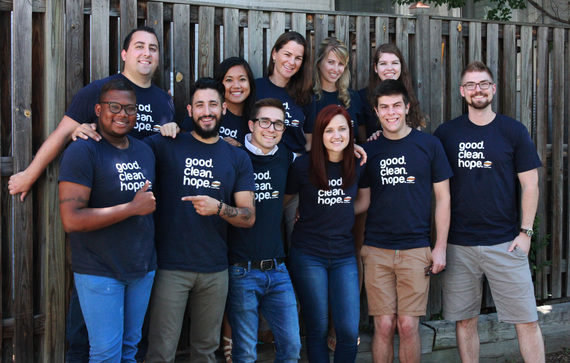Originally Posted on Techdayhq.com
If you Google "Scaling a Company", you'll get over 43 million hits on the subject. There are so many voices advising on how to take a start up past proof of concept to a well-oiled growth machine, and there's a reason. It's hard.
What is it honestly like to lead a company through this phase of growing pains and readjustment? How do you protect the people who have been with you from the beginning and also set up your baby for success? David Simnick, CEO and Co-Founder of SoapBox Soaps, provides insight on what it's really like to go through scaling and advice he's picked up along the way.
David:
First off, I would be remiss if I didn't say that SoapBox Soaps is still growing, facing challenges, and figuring out how to navigate through this world of business. In fact, we're right in the middle of getting our feet under us now, but I want to give people an honest account of what it's like to experience growing up while we're here, not just a few trite phrases of advice once we've "made it".
You Will Outgrow Partners and Systems That You Thought Were Great
When I started this company, it was because I had worked in the non-profit world and was unsatisfied with the solutions for funding clean water and hygiene projects. I wanted to give better and in a sustainable way, so I started a business that could be an ongoing engine for good with the freedom to give to only the best organizations. The model gave us the freedom to give with real impact, whether the organization was tiny or huge, foreign or domestic.
In the beginning, many of the charitable organizations we partnered with simply heard about us and reached out, and we gave to them because that's why we started the company! However, as we started to have a lot more to give, working with lots of small non-profits just wasn't feasible for our team to manage and monitor progress. We had to figure out how we could give with impact and how to also maintain control and ensure we didn't harm economies or create dependence. Partnering with large non-profits who themselves had scaled but had a great idea and were hyper-focused on sustainability and avoiding aid dependence allowed us to do that.
So What Do I Do?
When it comes time to move from one partnership to a new one, keep these things in mind: be earnest, timely, and put yourself in their shoes.
People want to work with good, honest people. If one of your customers were to cancel your contract, you'd want fair warning and the chance to correct the situation, wouldn't you? So be honest, if you start to outgrow a firm and they are not keeping up with the growth, immediately contact your account rep and address the concerns. If, after numerous attempts to correct the situation, there is little improvement, your partner will probably already expect the break up. Heck, they might even ask for it.
I've often found that honest communication is the best policy with any relationship. It is hard to speak candidly with anyone about their or your failures, but you'll save yourself and your partner a lot of time and pain by being upfront and transparent.
Your Company May Outgrow Your People... And You.
As a company scales, roles change, but the people in them stay the same. Your marketing director may have been really great at figuring out free ways to market your product in the beginning phases, but now they're being tasked with creating multi-channel marketing campaigns in national chains and, believe me, that's totally different. We've found that doing a periodic restructure of everyone's roles, with the goal of giving clarification of specific responsibilities, helps to alleviate these growing pains without calling out anyone in particular. It also gives us insight into when we really need to hire someone else to fill in the gaps.
As you hire more team members with your growth, you absolutely must trust and empower them because there's no way you're going to be able to micromanage everyone. Well honestly, if you hire the right people, they're probably going to think you're micromanaging them no matter what you do. Driven people want the game ball, so you have to entrust them with the responsibilities of their role and nurture their growth in it as best you can to keep them happy and productive.
Now, in the various inflection points of scaling a company, your role as the leader will change too. The type of person your startup needed you to be when you launched will be drastically different from the type they will need after you have reached a few million in revenue and have a team of 10. Being self-aware of those changes is essential to speedy growth, and possibly more important is accepting the fact that you may no longer be the best person for the set of tasks you used to be in charge of. I suggest bringing in an outside expert to conduct confidential 360 reviews to unearth both your strengths and weaknesses as a leader. You'll be glad you did.
Bring in the Suits!
Growing is hard, and planning for it is hard too, especially when you've never done it before. There's going to come a time when the next steps for your company are harder to see than in the early days. Particular to SoapBox, we hit a point where we had customers from various channels asking to carry our product but knew we couldn't service them all. The literally million-dollar question for us then became, where should we focus our efforts? We knew we needed help.
It may seem exorbitantly expensive or way to early to bring in consultants, but setting up the systems to avoid costly mistakes before you get too big to correct your path is critical. We decided to bring in a few consultants for weeks at a time to up-skill our team in different topics, create forecasting models for us, and provide strategic advice about organizational structure and sales strategy. We continue to consistently bring in subject experts for their advice in areas that our team has little knowledge but our company needs to do right the first time.
The first step is admitting you have no idea what you're doing. The second is finding the right mentors/consultants that want to help because they believe in you and your organization.
The advice from these experts will be invaluable and it is not the kind of stuff you can Google or watch a Coursera class on. It's based on years of experience and comes from people who are at the top of their game and will see problems within your organization that you didn't even know existed. Listen to them.


